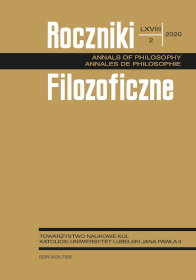The Epistemic Significance of Current Clear and Distinct Perceptions in Descartes’ Epistemology
Abstrakt
Znaczenie epistemiczne aktualnie jasnych i wyraźnych ujęć w epistemologii Kartezjusza
W niniejszym artykule omawiam kwestię dotyczącą roli, jaką Kartezjusz wyznaczył w budowie gmachu wiedzy pewnej temu, co można określić mianem aktualnie jasnych i wyraźnych ujęć (sądów poznawanych obecnie jasno i wyraźnie). Powyższa kwestia jest od dawna przedmiotem ożywionej dyskusji wśród komentatorów epistemologii Kartezjusza. W współczesnej literaturze historyczno-filozoficznej spotkać można dwie zasadnicze interpretacje na temat funkcji jaką pełnią w systemie Kartezjusza aktualnie jasne i wyraźne ujęcia. Pierwszą można nazwać interpretacją psychologiczną, drugą zaś normatywną. Ta ostatnia głosi, że aktualnie jasne i wyraźne ujęcia są całkowicie odporne na wątpienie zanim jeszcze dowiedzie się istnienia Boga i ustali ogólną regułę prawdy. Z tego względu ich pewność nie ogranicza się u Kartezjusza jedynie do pewności psychologicznej, lecz ma charakter normatywny. Opowiadam się za interpretacją normatywną. Przemawiają za nią – moim zdaniem – liczne racje. Ale rodzi ona także pewne trudności. Dlatego po przedstawieniu argumentów przemawiających na jej rzecz i niewątpliwych zalet wynikających z jej przyjęcia, omawiam szczegółowo pewne trudności zarówno tekstowe, jak i merytoryczne, którym musi sprostać ta interpretacja, jeśli mamy ją utrzymać.
Bibliografia
Bennett, Jonathan. 1990. “Truth and Stability in Descartes.” Supplementary volume, Meditations. Canadian Journal of Philosophy 16:75–108.
Bennett, Jonathan. 2001. Learning from Six Philosophers. Vol. 1. Oxford: Clarendon Press. Broughton, Janet. 2002. Descartes’s Method of Doubt. Princeton: Princeton University Press. Broughton, Janet. 1999. “The Method of Doubt.” In The Rationalists: Critical Essays on Descartes, Spinoza, and Leibniz, edited by Derk Pereboom, 1–18. Lanham, MD: Rowman and Littlefield.
Carriero, John P. 2009. Between Two Worlds: A Reading of Descartes’s Meditations. Princeton: Princeton University Press.
Carriero, John P. 2011. “The Cartesian Circle and the Foundations of Knowledge.” In A Companion to Descartes, edited by Janet Broughton and John P. Carriero, 302–18. Malden, MA: Wiley-Blackwell.
Cottingham, John. 1986. Descartes. Oxford: Blackwell.
Cottingham, John.1986. Cartesian Reflections. Essays on Descartes’s Philosophy. Oxford University Press.
Curley, Edwin. 2006. “The Cogito and the Foundations of Knowledge.” In The Blackwell Guide to Descartes’ Meditations, edited by Stephen Gaukroger. Malden, MA: Blackwell Publishing.
Della Rocca, Michael. 2011. “Taking the Fourth: Steps toward a New (Old) Reading of Descartes.” Midwest Studies In Philosophy 35 (1): 93–110.
Della Rocca, Michael. 2005. “Descartes, the Cartesian Circle, and Epistemology without God.” Philosophy and Phenomenological Research 70 (1): 1–33.
DeRose, Keith. 1992. “Descartes, Epistemic Principles, Epistemic Circularity, and Scientia.” Pacific Philosophical Quarterly 73:220–38.
Doney, Willis. 1955. “The Cartesian Circle.” Journal of the History of Ideas 16: 324–38.
Doney, Willis. 1970. “Descartes’s Conception of Perfect Knowledge.” Journal of the History of Philosophy 8:387–403.
Frankfurt, Harry. 1970. Demons, Dreamers, and Madmen. Indianapolis, IN: Bobbs-Merrill. Frankfurt, Harry. 1962. “Memory and the Cartesian Circle.” Philosophical Review 71:504–11. Gewirth, Alan. 1941. “The Cartesian Circle.” The Philosophical Review 50:368–95.
Gierulanka, Danuta. 1962. Zagadnienie swoistości poznania matematycznego. Warsaw: PWN. Gouhier, Henri. 1949. Essais sur Descartes. Paris: J. Vrin.
Gueroult, Martial. 1955–59. Malebranche. 3 vols. Paris: Aubier-Montaigne.
Hatfield, Gary. 2014. The Routledge Guidebook to Descartes’ Meditations. London: Routledge.
Hatfield, Gary. 2006. “The Cartesian Circle.” In The Blackwell Guide to Descartes’ Meditations, edited by Stephen Gaukgroger, 122–41. Malden, MA: Blackwell Publishing.
Hume, David, and Tom L. Beauchamp. 2000. The Clarendon Edition of the Works of David Hume. Vol. 3, An Enquiry concerning Human Understanding: A Critical Edition. Oxford: Clarendon Press.
Kenny, Anthony. 1968. Descartes. New York: Random House.
Kopania, Jerzy. 1988. Funkcje poznawcze Descartesa teorii idei. Białystok: Dział Wydawnictw Filii UW.
Kulstad, Mark. 1977. “Frankfurt’s Interpretation of Descartes’ Validation of Reason.” The Southwestern Journal of Philosophy 8 (2): 7–16.
Larmore, Charles. 1984. “Descartes’ Psychologistic Theory of Assent.” History of Philosophy Quarterly 1:61–74.
Loeb, Louis E. 1990. “The Priority of Reason in Descartes.” Philosophical Review 99 (1): 3–43.
Loeb, Louis E. 1992. “The Cartesian Circle.” In The Cambridge Companion to Descartes, edited by John Cottingham, 200–35. Cambridge: Cambridge University Press.
Markie, Peter. 1992. “The Cogito and Its Importance.” In The Cambridge Companion to Descartes, edited by John Cottingham. Cambridge: Cambridge University Press.
Newman, Lex, and Alan Nelson.1999. “Circumventing Cartesian Circles.” Nolis 33:370–404.
Newman, Lex. 2004. “Rocking the Foundations of Cartesian Knowledge: Critical Notice of Janet Broughton, ‘Descartes’s Method of Doubt’.” The Philosophical Review 113:101–25.
Newman, Lex. Winter 2014. “Descartes’ Epistemology.” In The Stanford Encyclopedia of Philosophy, edited by Edward N. Zalta. http://plato.stanford.edu/archives/win2014/entries/descartes-epistemology/.
Nolan, Lawrence. 2016. The Cambridge Descartes Lexicon. Cambridge: Cambridge University Press.
Van Cleve, James. 1998. “Foundationalism, Epistemic Principles, and the Cartesian Circle.” In Descartes, edited by John Cottingham. Oxford: Oxford University Press.
Ragland, C. P. 2016. The Will to Reason: Theodicy and Freedom in Descartes. New York: Oxford University Press.
Williams, Bernard. 1978. Descartes: The Project of Pure Enquiry. Atlantic Highlands, NJ: Humanities Press.
Copyright (c) 2020 Roczniki Filozoficzne

Utwór dostępny jest na licencji Creative Commons Uznanie autorstwa – Użycie niekomercyjne – Bez utworów zależnych 4.0 Międzynarodowe.





